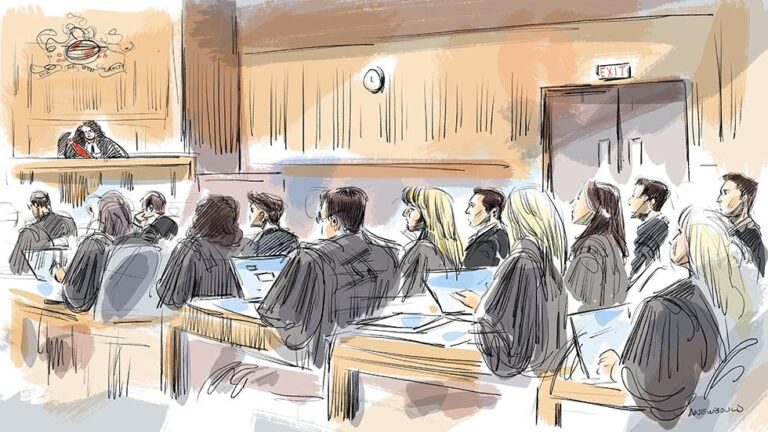Trial Highlights: Survivor’s Testimony and Defense Tactics in Junior Hockey Sexual Assault Case
A woman has taken the stand in a widely publicized trial concerning allegations of sexual assault involving members of the Canadian junior hockey team. Her testimony has drawn attention to what she perceives as purposeful tactics by the defense aimed at discrediting her claims. In a recent court appearance, she voiced her apprehension that the defense’s questioning strategy was designed to undermine her credibility and divert focus from the key issues at stake. As this legal drama unfolds, it underscores the intricate challenges survivors face within the judicial system, igniting broader conversations about accountability, sexual violence in sports, and societal attitudes towards these serious matters.
Challenging Discredit: Survivor Addresses Defense tactics in Hockey assault Case
The woman testifying against alleged perpetrators during this high-profile trial has accused the defense of employing strategies primarily focused on discrediting her narrative. Throughout her testimony, she recounted instances where she felt that their approach was aimed at portraying her as untrustworthy. She stated that such tactics are not only distressing but also harmful to achieving justice. “They want to paint me as dishonest,” she declared, highlighting how an emphasis on her personal history and emotional reactions seemed intended to distract from critical aspects of the case.
During her statements, she detailed specific methods used by the defense that troubled her deeply:
- Intrusive personal inquiries designed to elicit emotional responses.
- Attempts to reference past relationships as potential evidence for inconsistency.
- Repetitive questioning, which could confuse or mislead jurors regarding events from that night.
The survivor expressed determination not to be undermined by these tactics, asserting that she would not allow herself​ to be invalidated. The courtroom has transformed into a battleground for competing narratives as both sides strive to shape jury perceptions regarding presented evidence.
Cross-Examination Impact: Perceptions of Defense Strategies in Sexual Assault Trials
This ongoing trial related to allegations of sexual assault during a world junior hockey tournament has sparked notable dialog about cross-examination techniques employed by defense attorneys. The alleged victim articulated concerns over how these lines of questioning seem strategically crafted to erode trust in her account. Observers have noted common approaches often include:
- Skepticism Towards Consistency: Examining previous statements or behaviors for inconsistencies.
- Moral Character Attacks: Highlighting unrelated personal failings or histories.
- Diminishing Incident Severity: Framing experiences as less impactful than claimed by victims.
Laws experts specializing in sexual assault cases argue that such strategies can impose significant psychological strain on victims and may discourage them from seeking justice altogether. Research indicates even truthful responses can lead victims feeling distressed due to adversarial interrogation styles. To illustrate this dynamic further, consider this table summarizing prevalent defense tactics alongside their psychological effects on survivors:
| Tactic Used by Defense | Psycho-emotional Impact on Victim |
|---|---|
| Prying Personal questions | Cultivates feelings of anxiety and shamefulness |
Future Directions: Recommendations for equitable Practices in Sexual Assault Trials
A fair judicial process is essential for all parties involved in sexual assault trials; thus reforms must be implemented with urgency. Courts should prioritize training judges and legal professionals about trauma-informed practices so they can better understand how trauma affects testimonies and behaviors among victims. Additionally, establishing standardized protocols for witness questioning could help reduce re-traumatization risks during cross-examinations.
Key recommendations include:
- Mandatory education focusing on trauma awareness & victim psychology
- Standardized techniques governing cross-examinations
- Clear guidelines prohibiting objectionable inquiry practices
Moreover , there should be greater emphasis placed upon providing supportive measures throughout trial processes . This includes access mental health resources ,along with options allowing testimony via video link or other non-invasive means when necessary . public awareness campaigns can also play an important role demystifying legal proceedings while fostering informed community perspectives surrounding cases involving sexual violence . Collaboration between legal experts , advocacy organizations , policymakers will prove vital facilitating these changes . A proposed framework might encompass:
| Strategy | Objective | |
|---|---|---|
| Victim Support Services | Enhance emotional & psychological assistance | |
| Public Education Initiatives | Raise community awareness & understanding | |
| Legal Reform Committees | Advocate sensitive practices towards victims within law systems. |
In Summary Â
The ongoing world junior hockey sex assault trial continues unfolding dramatically; with central figure speaking out against perceived attempts made thru aggressive questioning meant discredit testimony provided before court . As proceedings progress both sides remain firmly entrenched positions raising crucial questions surrounding broader societal issues including those related support offered survivors complexities inherent within sensitive nature such cases encountered throughout judicial processes today . Public attention remains fixed courtroom where outcome holds potential implications shaping future discussions accountability justice instances involving acts committed against individuals experiencing violence based upon gender identity orientation etc.. We will keep monitoring developments closely providing updates whenever new facts becomes available .




